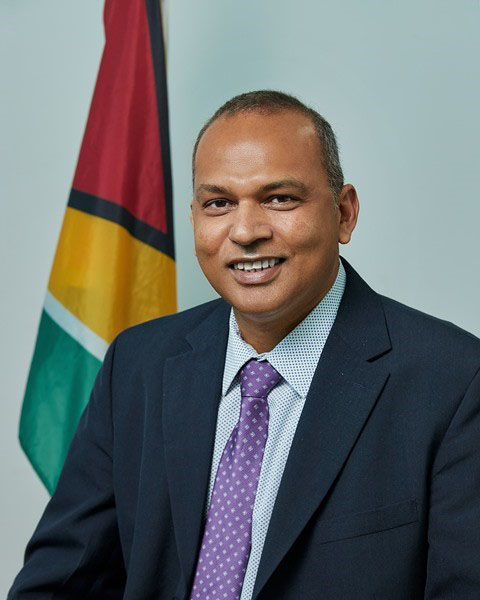With a reported 74% of the country’s deaths being due to non-communicable diseases (NCDS) and diabetes cases pegged at a staggering 60,000 plus, the government is now planning the implementation of a national healthcare database system, to aid in strategic policies to reduce new cases since no data is currently collected from persons with NCDs.
Guyana’s National Commission on NCDs states that: “74% of our deaths are now due to the NCDs and more than 32% of all NCD deaths are premature.”
“We have not been collecting that data because it is not a requirement for hospitals to report on cases like diabetic patients or strokes or heart disease and attacks… but to help in our policy planning, this is something that will have to change because we need that data. We have to get a national database,” Health Minister Dr Frank Anthony told the Stabroek News in an interview last week.
“When people come to the [public] health facilities and hospitals, we treat them… but like I explained [getting the data] is something that we are going to change.”
At present, only when people die is their data accessible, as causes of death have to be stated on death certificates. He explained that the government will not only be better able to track the healthcare needs of citizens in the country, but find strategies to make them healthier.
Anthony said that the 60,000-plus estimate was taken from the International Diabetes Federation (IDF), a non-profit umbrella organisation of more than 240 national diabetes associations in 161 countries and territories.
The Pan American Health Organisation’s Step Survey Country Report released in June of 2021 stated that in Guyana, 68% of deaths in 2016 were attributed to NCDs, specifically, cardiovascular disease (34%), cancers (8%), diabetes (8%), and chronic respiratory diseases (3%).
As part of this country’s NCD strategic plan/plan of action for 2020-2030, having the registry database of people being treated for non-communicable diseases is a priority.
With regard to diabetes, the Minister of Health pointed out that from information received from healthcare facilities around the country, less than 200 persons receive medication for Type 1 diabetes, a type believed to be caused by an autoimmune reaction and which develops early in life.
“The majority of people with diabetes here acquire it due to lifestyle factors such as, obesity, food choices and activity levels…,” he explained.
Diabetes, he pointed out, is also responsible for the majority of amputations. There are currently no figures on the number of amputees in the country, but Anthony noted that 91 persons are currently registered at the Ptolemy Reid Rehabilitation Centre, in Georgetown, for prostheses. “We don’t have a number for amputees in the country. To build the database, we would have to get people to register and so forth which is what the plan is,” he stressed.
So far for this year, the government has paid for the manufacturing of 17 prostheses and estimates that another 20 will be donated by the end of December.
People receiving dialysis through assistance from the government total 330, but Anthony explained that there are some who can afford the treatment and pay for it themselves. As such, it is unclear how many cases there are altogether here.
The treatment is primarily done in Georgetown, but through a collaboration with this country’s first dialysis treatment centre, 5G Dialysis Centre, the government has now taken that service to Essequibo and Linden. “5G has space at Suddie Hospital and they are manning the unit there. So persons who need treatment on the Essequibo can get it there,” he said.
“In Linden, there is another partnership with 5G. Persons who need treatment don’t have to come to town but can access from right there. In Region Six we have a partnership with Doobay, using our facility but they are offering the treatment.”
With the partnerships, Anthony said, the costs have been reduced significantly.
‘Still Difficult’
The NDC Commission has bemoaned the fact that enough was not being done to identify risks, even though it had been advocating for HBA1c testing since 2021.
“In 2021, 2022 and now in 2023, the NCD Commission advocated for more robust testing for HBA1c in primary health care. We are disappointed that HBA1c (a blood test that shows what the average blood sugar level was over the past two to three months) testing is still difficult to access in the public health sector. Very few persons have access to HBA1c testing in health posts and health centres and in district hospitals. Disappointingly, very few people have access to HBA1c testing in Regional Hospitals still… We urge the MOH to correct this lapse… This is an example to show that Health for All is still an illusion. We must work towards genuine reduction of health inequity, and this is one way to do so,” the commission had stated in a release to mark World Health Day.
The statement said that food and nutrition remain a major strategy in the fight against both NCDs and infectious diseases.
“Our children are still exposed to unhealthy food and our efforts to mitigate the problem remain timid. Front of the package labelling cannot be yet another slogan. We must advocate and ensure that it happens. Salty, sugary, ultra-processed foods are killing us and we remain on the sidelines as bad food kills more of us than any infectious pandemic has ever done,” the statement said.
“There is an opportunity for us in Guyana to do more… While we are grateful that the MOH has recently launched the Diabetic Centre of Excellence at Lusignan, we must ensure quality diabetic services reach all citizens in Guyana. The last Diabetic Treatment and Care Guidelines, Edition 3, was published in 2008. Since then, no amendment has been made.”






